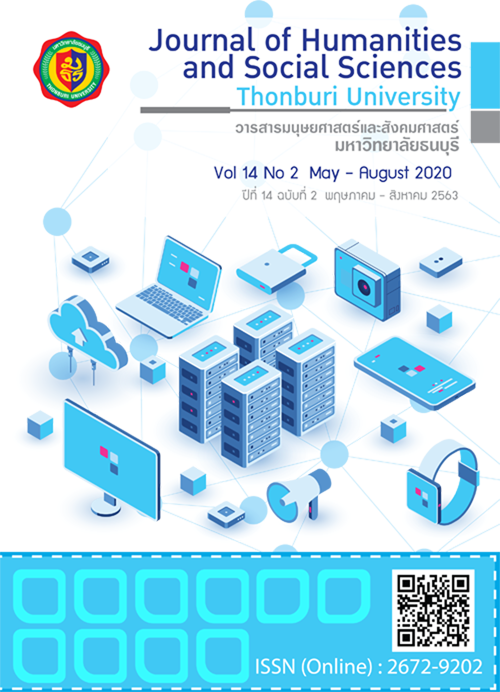A Development of Computer Assisted Instruction (CAI) on Machine Tool Practice for First Year Student of Department of Teacher Training in Mechanical Engineering, Faculty of Technical Education, King Mongkut’s University of Technology North Bangkok
Keywords:
Computer Assisted Instruction, Performance, Academic Achievement, SatisfactionAbstract
The objectives of this research were: 1) to develop the quality of computer-assisted instruction on Machine tool practice had performance, 2) to determine the efficiency of computer-assisted instruction on base 80/80, 3) to compare learning achievement of pretest and posttest by computer-assisted instruction and 4) to questionnaire on satisfaction of student toward the computer-assisted. Data were analyzed by using statistics including mean, standard deviation and t-test for dependent sample.
The result of this study showed that 1) computer-assisted had overall content quality, media quality and media production technique at a good level, 2) the efficiency of computer-assisted was 82.16/84.66 that met the set hypothesis, 3) Academic achievement of students taught by computer-assisted instruction was higher than before with a statistical signification level of 0.5, accepting the set hypothesis and 4) the satisfaction of the students was highest level with the mean of 4.56 and standard deviation of 0.55.
References
กระทรวงศึกษาธิการ. สำนักงานปลัดกระทรวงศึกษาธิการ. (2561). พระราชบัญญัติการศึกษาแห่งชาติ พ.ศ. 2542 แก้ไขเพิ่มเติม
(ฉบับที่ 2) พ.ศ. 2545 และ (ฉบับที่ 3) พ.ศ. 2553. สืบค้นเมื่อ 27 เมษายน 2561, จาก https://person.mwit.ac.th/01-Statutes/ NationalEducation.pdf.
กัตภณ พลิ้วไธสง. (2559). การเปรียบเทียบผลสัมฤทธิ์ทางการเรียนของนักศึกษาปริญญาตรี สาขาวิชาวิศวกรรมเมคคาทรอนิกส์ ผ่านบทเรียนอิเล็กทรอนิกส์ออนไลน์ ในรายวิชาฟัซซีลอจิก. วารสารวิชาการ มหาวิทยาลัยธนบุรี. 10(22): 21-27.
ธนภรณ์ กาญจนพันธ์. (2559). ผลการจัดการเรียนรู้แบบห้องเรียนกลับทางการเรียนวิชาชีววิทยาการกำกับตนเอง แลความพึงพอใจต่อการจัดการเรียนรู้ของนักเรียนชั้นมัธยมศึกษาปีที่ 5. วิทยานิพนธ์ศึกษาศาสตรมหาบัณฑิตมหาวิทยาลัยสงขลานครินทร์.
เมธา อึ่งทอง; ผดุงชัย ภู่พัฒน์; และ ชิตพล มังคลากุล. (2561). การพัฒนารูปแบบการจัดการเรียนการสอนแบบห้องเรียนกลับด้าน เพื่อส่งเสริมผลสัมฤทธิ์ทางการเรียนวิชาหลักวิชาชีพครู. วารสารวิชาการ มหาวิทยาลัยธนบุรี. 12(ฉบับพิเศษ): 82-92.
วีรวัฒน์ ยอดมั่น;และ วิสูตร โพธิ์เงิน. (2558:381-382). การพัฒนาบทเรียนคอมพิวเตอร์ช่วยสอน กลุ่มสาระการเรียนรู้ศิลปะ เรื่อง ทฤษฎีสีเพื่อการเรียนรู้ศิลปะประเภทจิตรกรรม สำหรับนักเรียนระดับชั้นมัธยมศึกษาตอนปลาย. วารสารวิชาการ Veridian E-Journal. 8(3): 381-385.
สุพรรณษา ครุฑเงิน. (2555). สื่อมัลติมีเดียเพื่อการเรียนรู้ด้วยตนเอง เรื่องข้อมูลและสารสนเทศ สำหรับนักเรียนชั้นมัธยมศึกษาปีที่ 1. วิทยานิพนธ์ศึกษาศาสตร์มหาบัณฑิต มหาวิทยาลัยราชมงคลธัญบุรี.
สุราษฎร์ พรมจันทร. (2550). การพัฒนาหลักสูตรรายวิชา. กรุงเทพฯ: มหาวิทยาลัยเทคโนโลยีพระจอมเกล้าพระนครเหนือ.
อดิเรก เยาว์วงศ์;และ ณมน จีรังสุวรรณ. (2555). การพัฒนารูปแบบการเรียนรู้โดยใช้ปัญหาหลัก บทการปฏิบัติการทดลองเสมือนจริง โดยใช้โปรแกรมจำลองเครือข่ายคอมพิวเตอร์ สำหรับวิชาเครือข่ายคอมพิวเตอร์. วารสารวิชาการ มหาวิทยาลัยธนบุรี. 6(12): 37-44.
Skinner, B.F. (1954). The Art of teaching End the Science of Learning. (Harv. Edu ca. Rex.24,1954).
Translated Thai References
Kanjanapan, T. (2012). Effect of Flipped Classroom Approach on Biology Achievement, Self-Regulation and Instructional Satisfaction of the Grade 11 Students. (Master of Education Thesis, Prince of Songkla University). (in Thai)
Khutngern, S. (2012). The self-learning multimedia on data and information for mathayomsuksa 1 students. (Master of Education Thesis, Rajamangala University of Technology Thanyaburi). (in Thai)
Ministry of Education. Office of the Permanent Secretary. (2018). National Education Act B.E. (1999). Improve (2). 2002, Improve (3). 2010. Retrieved April 27, 2018, from https://person.mwit.ac.th/01-Statutes/National Education.pdf.
Oungthong, M.; Pupat, P.;& MungKhalakun, C. (2018). A Development of Flipped Classroom Instruction Model to Enhance Learning Achievement in The Principles of Teaching Profession Course. Journal of Thonburi University. 12(Special): 82-92. (in Thai)
Prewthaisong, K. (2016). Comparison of Learning Achievement of Undergraduate Mechatronics Engineering Students by Learning Online e-Learning Course on Fuzzy Logic. Journal of Thonburi University. 10(22): 21-27. (in Thai)
Promjan, S. (2010). Course Development. Bangkok: King Mongkut’s University of Technology North Bangkok. (in Thai)
Yaowong, Adirek;& Jeerungsuwan, N. (2012). The Development of Learning Model with Problem-based Learning on virtual Laboratory Using Network Simulation for Computer Network Course. Journal of Thonburi University. 6(12): 37-44. (in Thai)
Yonmon, W.;& PoNgern, W. (2015). The Development of Computer-Assisted Instruction in Art Subject: Color Theory of Painting for Secondary School Students. Veridian E-Journal Slipakorn University. 8(3): 374-387. (in Thai)







